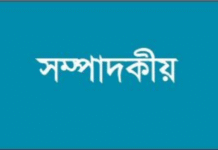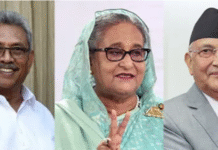
The house late minister Sayedul Hoque lived in
Since the beginning of his career in politics, Muhammed Sayedul Hoque ran all of his local political activities from a couple of tin sheds which doubled up as his house at Nasirnagar upazila in Brahmanbaria.
Even after he was elected to a fifth term as the MP for Brahmanbaria-1 constituency and was made the fisheries and livestock minister of the Awami League-led government, that setting did not change.
Sayedul used to stay in the tin shed houses – which he inherited from his father and appear on the verge of collapse – whenever he was at Nasirnagar for any reason, personal or political.
The sheds may be still standing – just – but they have already hosted their last meeting with Sayedul in the chair.
The veteran politician, loved by his locals and respected by all in the country’s political arena, passed away at Bangabandhu Sheikh Mujib Medical University (BSMMU) Hospital in Dhaka on Saturday morning. He was 75.
“The man, who always led a simple life, would sit and listen to his people’s problems, and resolve them personally,” said Rafi Uddin, a long-time political associate of Sayedul.
“As a public representative, he was known for his honesty in the district, which made him reliable. He was always there for his constituents in every turn, making sure that the trust they put on him was kept,” said Rafi.
Rafi, who is the president of Nasirnagar Awami League unit, told the Dhaka Tribune that Sayedul was responsible for most of the development the upazila has seen so far.
“Nasirnagar was originally a haor upazila. It was very difficult to go from here to the district town by boat and the travel usually took eight hours.
“After he was elected MP, Sayedul took it upon himself to have the government build a road over Akashi Haor to the district town. Now it only takes three hours to go there.”
Sayedul had also acted promptly in catching the corrupt contractor who built the road, and saw to it that he was punished. “He was always honest like that,” Rafi Uddin added.
Born on March 4, 1942, Sayedul Hoque was buried at the family graveyard at the upazila’s Purbobhagh village on Sunday.
Sayedul’s nephew, Abdur Rahim, the headmaster of Ashutosh Pilot High School, said the heartbroken locals were still grieving over the loss of their “beacon of hope”.
He said: “His honesty, love for the people and contribution to the upazila’s massive development were the reasons he was elected five times. During his tenure, Bangladesh became the fourth largest producer of fish and goat products.
“He used to admonish his own party members involved in malpractices. He provided immediate solutions to any problem of regular people. This was proof of his humanity,” added Rahim.
Talking about Sayedul’s personal life, he said Sayedul did not lead an extravagant life despite being a minister. “The locals were always welcome to meet him at his home whenever he was at Nasirnagar,” he said.
The minister, also known for treating every constituent equally, was popular among the religious minority communities of the upazila.
His death has also struck these communities hard as many said they were worried about the future after their guardian’s demise.
According to locals, about 40% of the votes he had received during past elections came from the Hindu community in Nasirnagar.
Nasirnagar Gaur Temple management committee’s general secretary, Nirmal Chowdhury, told the Dhaka Tribune: “I have known Sayedul Hoque since my childhood. He was the umbrella over our heads.
“He always helped us in every issue. During his time in office, no one dared to illegally occupy land from the minority groups. His death has created a void that will never be filled. Only god knows what will happen in his absence.”
Ananth Bondhu Das, a leader of the Dasapara fisherman community, said Sayedul Hoque was their guardian. “He had helped us buy fishing nets at a very low price to ensure our livelihood.”
He added that now they were worried about their future as they had no idea who will fill his position and whether that person will look after them the way the minister did.
Senior Awami League leader Sayedul Hoque was a close ally of Bangabandhu Sheikh Mujibur Rahman during Bangabandhu’s Six-Point Movement in 1966. He also played a vital role in the 1971 Liberation War.
Before that, he was elected vice-president of the student council at Brahmanbaria Government College in 1968.
That year, he had also established the Nasirnagar Awami League unit with the help of Dhirendra Nath Dutta and Khorshed Alam.
Sayedul also played active roles during 1969 mass uprising and the 1970 elections.
He was elected to the Brahmanbaria-1 seat in 1973 during the first parliamentary polls. He was again elected in the 1996, 2001, 2008 and 2014 elections.
Source: Dhaka Tribune.









